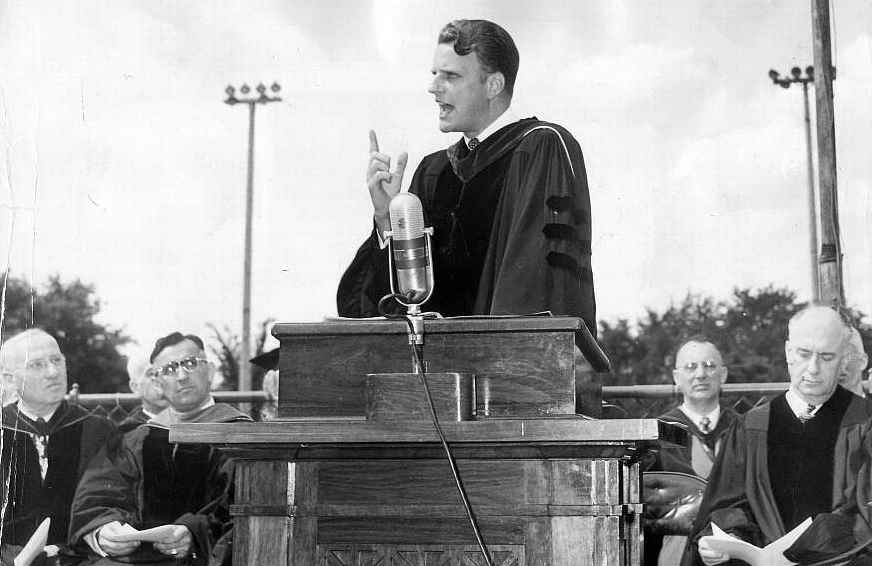
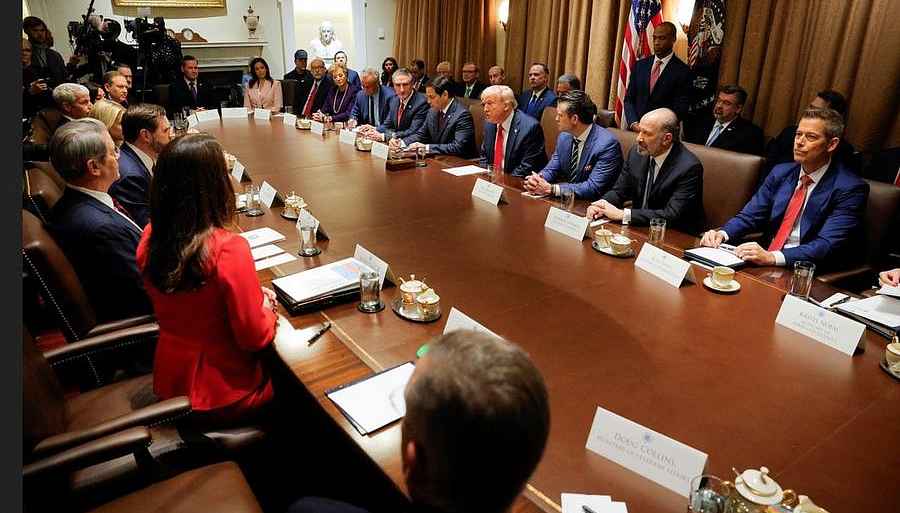
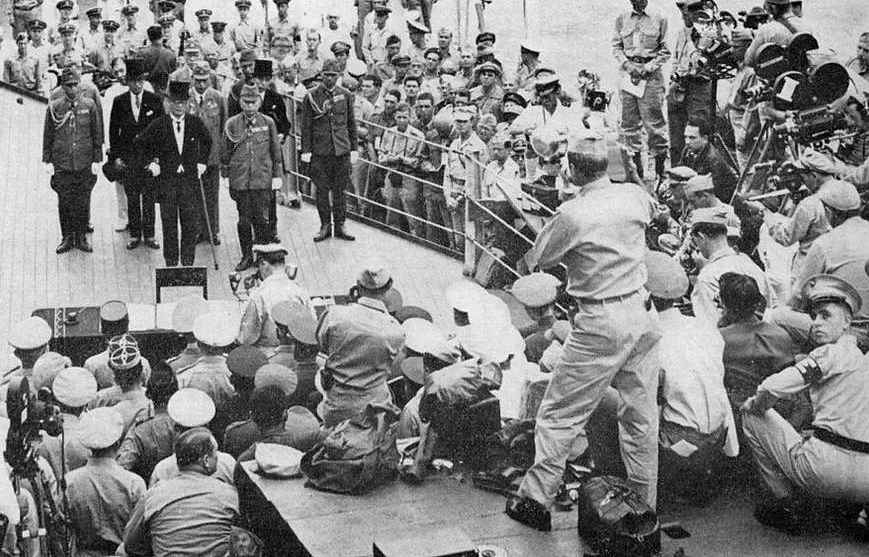
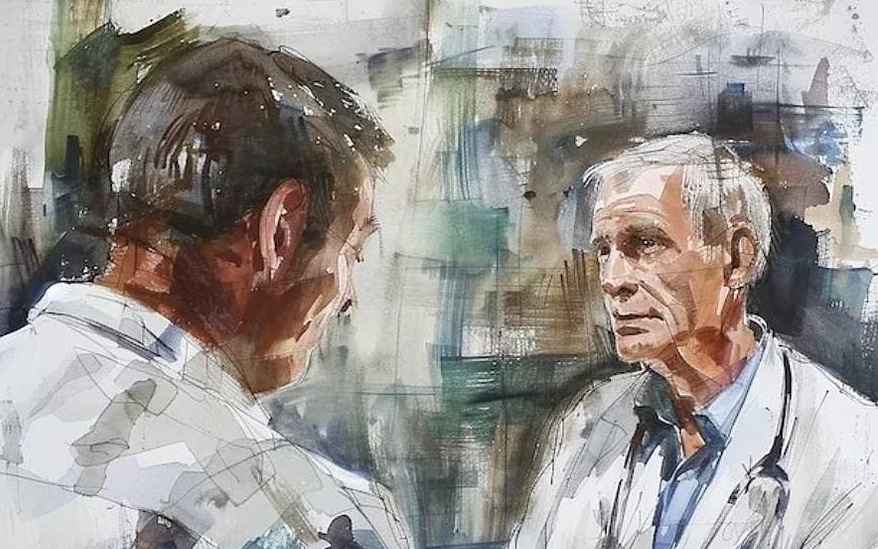

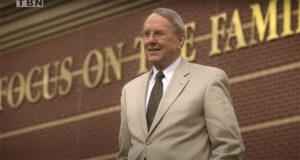
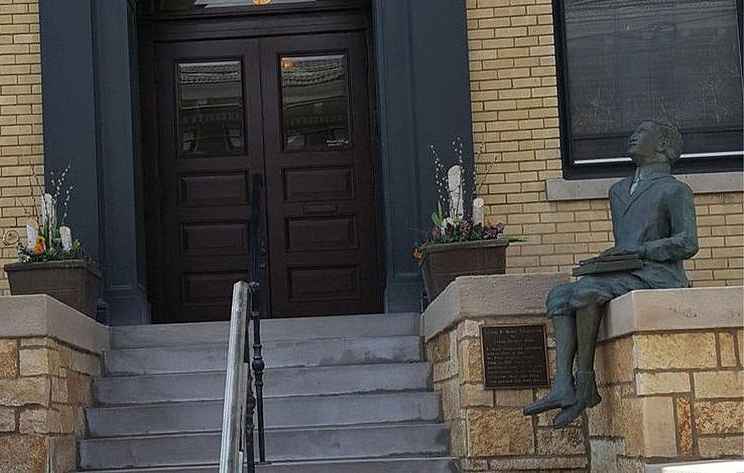
See listing of Recent and Most Popular articles on the Home Page
Faith
Category: News & Current Events / Topics: Beliefs • Bible • Personal Stories (Biography/Autobiography) • Character, Integrity • History • Inspiration • Jesus • Memories • News • Religion • Tribute, Testimony
Remembering Billy Graham
by Stu Johnson
Posted: February 24, 2018
A tribute to a remarkable man of God…
No. 13 in the Thursday Morning Guy’s group series (see list)
Once again, I report from the Thursday Morning Guys group I’ve been attending at a local church. Each week one of the guys suggests a topic for discussion. The topic at the February 22 session focused on news the day before of the death of evangelist Billy Graham at the age of 99. Wheaton College is prominent in this article because the church where the Guys Group meets is not far from the college and includes alumni and former faculty and staff.
THE DISCUSSION STARTER
Topic suggested by one of the guys, shared at the meeting
I had a lot of topic ideas swirling around this week, from the frivolous (what was your favorite car?) to the serious (is America undermining its centuries-old concept of the presumption of innocence). We can do those later if we want, but this morning I think there is only one topic for us: Billy Graham. Famous evangelists have always been part of American religious life from Jonathon Edwards in the 19th Century to Bill Sunday in the 20th, among so many others. Was Billy Graham something else? How did he affect each of us personally? And the country? Was he really “American’s pastor?”
Leading into the discussion, several statistics were cited from a letter sent the day before to Wheaton College alumni by President Philip Ryken:
We learned today that Billy Graham '43 LITT.D. '56, Wheaton's most well-known alumnus, has entered his heavenly rest. The Wheaton College family worldwide grieves his death with members of the Graham family and the Billy Graham Evangelistic Association team, and rejoices with them that this beloved servant of the Lord has completed his journey and is at home with his Savior. A special memorial website for Billy Graham is available at wheaton.edu/billygraham.
Billy Graham preached the gospel to 215 million people in live audiences in 185 countries and territories at more than 400 crusades, missions, and evangelistic rallies. His influence for the Kingdom of the Lord Jesus Christ is beyond human measure. He provided spiritual counsel to every president from Harry S. Truman to Barack Obama and was sought out by countless other political and religious leaders around the world spanning several generations. Renowned for his humility, transparency, simplicity and integrity, Billy Graham proved faithful to the end as a "prophet with honor." . . . .
REMEMBERING BILLY GRAHAM
From those who had contact with him
Two of the group had personal contact with Billy Graham and his associates, one as an administrator at Wheaton College, the other as a journalist and editor for Newsweek magazine. How they saw him:
- Billy Graham’s entrance on the national stage came with his 1949 crusade in Los Angeles—helped along by William Randolph Hearst’s famous orders to his papers across the country to “puff Graham.” (The term “Crusade” at that time was common, not just for religious revival meetings, but charities, building campaigns, and similar major endeavors.)
- As depicted well in one episode of the Netflix series “The Crown,” when Graham went to London in 1954, he was perceived by many as nothing more than a hick preacher from America, yet Queen Elizabeth sought him out for advice. That episode portrayed the human side of Elizabeth, whose authority was second only to God, but who struggled over the impact that her uncle’s abdication as King Edward had on her family, and whether she could forgive him. Graham is portrayed as most people remember him: humble, but forthright in matters of faith, seeming to connect well with the monarch who described herself as just “a simple Christian.”
- When Billy Graham visited U.S. President Harry Truman, it was reported that Truman was upset because Graham was seen kneeling in prayer on the White House lawn afterward. Yet, assuredly, Billy’s motivation was to ask God’s blessing on this man who carried such a burden, not with a sense of vindication for anything Truman said or represented.
- Billy Graham met with many world leaders, including every president from Truman to Barack Obama. Along the way, especially in his relationship with Richard Nixon, Graham was caught up in politics and learned to be more circumspect.
- Asked about the difference between his relationship with Nixon and Jimmy Carter (whose Christian faith as a Southern Baptist was well known), it was suggested that in person Richard Nixon had a persona that Graham related to and it was only later, when details of taped conversations came out in the Watergate scandal, that he saw the darker side of Nixon. With Carter, any coolness could possibly have been attributed both to Graham’s political leaning (outwardly non-partisan, but Republican-leaning) and his own desire to distant himself from being identified as a southern preacher .
- While still a student at Wheaton College, the future journalist in our group recalled being in “The Stupe,” a popular gathering place in the student center, when Billy Graham came through with Ruth, Wheaton President Raymond Edman, and others. Impressed by his humility and youthful appearance, he realized that Graham had become a world figure before the age of 40 (Billy would have been 37 at that time).
- Graha was a great speaker. His North Carolina accent added a distinction that was a asset. To avoid a regional label, he surrounded himself with people from diverse backgrounds: singer George Beverly Shea was from Canada, musical director Cliff Barrows from California, and Graham’s connections in through Wheaton College, Youth for Christ, and other ministries set the stage for broad recognition. While he called North Carolina home, the headquarters for the Billy Graham Evangelistic Association would be established in Minneapolis. (He had served as president of Northwestern College in nearby St. Paul from 1948 to 1952).
- The Minneapolis headquarters were first located in a spartan warehouse, but even then, reflected the high degree of organization that was so much a part of Graham’s effectiveness.
- The style of a Billy Graham crusade grew out of American tent meetings, with the “altar call” at the end of each service reflecting the “sawdust trail” memorialized by those revival meetings that had particular appeal to fundamentalist Protestants. Billy Graham developed the format to reach a far broader audience. Great organizational strength and exposure on television brought ever-increasing recognition (this was before cable, so it was common in many cities to be carried live on one of the few channels available at that time).
- While the revival meeting tradition was associated with predominantly fundamentalist churches, a Billy Graham Crusade invited all churches in the area to participate. (While he was criticized for that, remember that those churches who joined in the effort knew what to expect: a direct presentation of the Gospel of Christ).
- When people went forward in response to the “altar call” (usually while the choir sang “Just as I Am”), all of those who made decisions to receive Christ as savior were given follow-up materials and connected with a local church. (Re-dedications and special appeals were also made, as I will share later).
- When Wheaton College was being discussed as the location for the Billy Graham Center, Billy insisted he did want a building to be a monument to him, but a place of service to the Kingdom of Christ.
- Ruth Graham was remembered as a strong and often feisty counterpoint to her famous husband. With Billy away from home for months at a time, Ruth was responsible for the kids. Franklin, in particular, was often “off the reservation” (the prodigal would later return to take on the mantle of his father’s work). Asked about the burden of maintaining the home front, Barbara Walters asked Ruth if she had ever considered divorce. “Divorce, no,” said Ruth, then added with her uncanny sense of timing and humor, “but murder, yes.” Ruth would become well known in her own right as an author and speaker.
- When Billy and Ruth were building their mountain-top home in North Carolina, people would stop on the nearby road to take pictures. For a time, as the story goes, Billy worked in an out building and was known to crawl back to the house behind some bushes to avoid the crowd gathered nearby. He thought one fireplace would be adequate, but Ruth was in charge during his long absences, and the house ended up with seven fireplaces!
From others in the group:
- Some of the qualities that made Billy Graham so effective:
- Use of television and marketing—God called Graham, the best person at the best time in history, to carry out his (God’s) plan, something that would be nearly impossible in today’s media-saturated environment. The term “Crusade” would be seen as insensitive and inappropriate today.
- Organization. One of the guys was in the military when Billy Graham conducted his first crusade on a military base, at Fort Campbell. It was conducted with military precision. Part of every crusade, including this one, was Operation Andrew (after the biblical principle of the calling of Jesus’ disciples), which enlisted the help of churches and people in the community. This was then reflected in the connection to local churches made with those who came forward at the end of each service.
- Humility. He did get the swelled head that effects many who get in the spotlight. Mistakes were made (who wouldn’t?) but Billy handled them well. He showed good character, stayed the course and finished the race. Ruth “brought him back to earth.”
- Personal integrity. Today, we put people on pedestals, only to tear them down. While no one can escape some controversy, Billy Graham avoided career-ending scandal with a well-disciplined team around him. Early on, he was advised to let others take care of finances, not be alone in the presence of a woman, and other disciplines to prevent the downfall we continue to see with people in the public eye. (Someone pointed out that the misfortune behind the need for that is very evident today, which shows the need to teach proper relationships).
- Kept message simple, essential—television bookers knew that he (and Franklin) would always get the Gospel in, even in the shortest appearances
- Other memories or observations:
- One related a text exchange with a friend who said she cried when she heard of Billy Graham’s death, not because he had died as much as the life-changing impact one of his crusades had on her life.
- Billy appeared on an episode of Laugh-In, where in typical fashion he was able to make a concise, clear presentation of the Gospel message. When Artie Johnson ended the show with his usual “that’s interesting” comment, he added “think about it.”
- While Billy Graham has been referred to as “America’s pastor,” one of the guys thought that description a bit of a stetch, since he grew up in a non-Christian, non-religious home where Bill Graham had no impact. It was years later that he came to faith.
- Another remembered his own exposure to “fire and brimstone” revival meetings and the criticism of Graham for being too “liberal/”
- I shared a personal experience from a Billy Graham Crusade in Chicago in 1962, during my senior year in high school. The invitation included indication of interest in missions, an emphasis that night. I had developed an interest in electronics and missionary radio, so went forward. The counselor I met (clearly by God’s providence!) was a businessman who happened to know the general manager of the NBC television station in Chicago. The combination of that contact and the fact that I had acquired a First Class Commercial Radio Operator’s License led to employment during as a “summer-relief” camera operator on the technical crew while I was a student at Wheaton College. While I did not go to the foreign mission field, I did return to Wheaton to manage the college radio station and teach communications (primarily media courses).
What stories or impressions can you add?
GUIDANCE FROM SCRIPTURE (God’s written Word, the Holy Bible)
Instead of the usual list of Scripture references when we’re dealing with a topic, you may wish to visit the Grow Your Faith section of the Billy Graham Evangelistic Association website. You may also find helpful resources on the Seeking God section of this website (some of them make use of Billy Graham material).
The Way, the Truth, and the Life
words seen on banners at many Billy Graham crusades came from the Gospel of John:
Jesus told him, “I am the way, the truth, and the life. No one can come to the Father except through me” (John 14:6)
About the Scripture references: unless indicated otherwise, these are taken from the New Living Translation (NLT). Links connect to BibleGateway.com, where you can see other translations, view the broader context, listen to an audio version and find other Bible resources. Also check the resources available in the Enrich/Faith section of this site.
Search all articles by Stu Johnson
Stu Johnson is principal of Stuart Johnson & Associates, a communications consultancy in Wheaton, Illinois. He is publisher and editor of SeniorLifestyle, writes the InfoMatters blog on his own website and contributes articles for SeniorLifestyle. • Author bio (website*) • E-mail the author (moc.setaicossajs@uts*) • Author's website (personal or primary**)* For web-based email, you may need to copy and paste the address yourself.
** opens in a new tab or window. Close it to return here.
Posted: February 24, 2018 Accessed 621 times
![]() Go to the list of most recent Faith Articles
Go to the list of most recent Faith Articles
![]() Search Faith (You can expand the search to the entire site)
Search Faith (You can expand the search to the entire site)
![]() Go to the list of Most Recent and Most Popular Articles across the site (Home Page)
Go to the list of Most Recent and Most Popular Articles across the site (Home Page)
 Loading requested view...
Loading requested view...